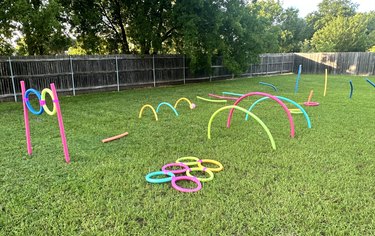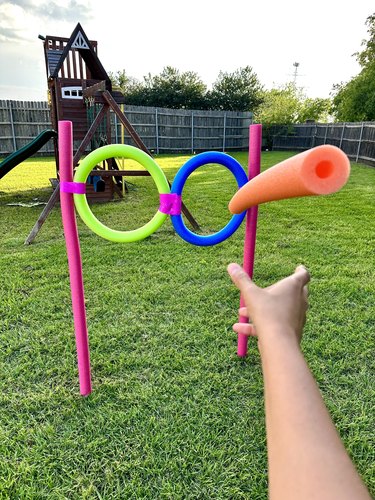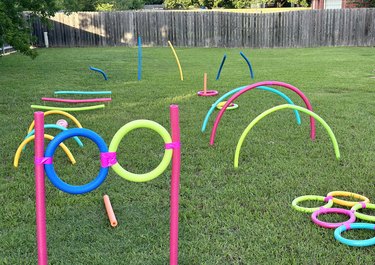
Summer is here, and what better way to celebrate the school break than with a splash of fun? We're diving into a creative project perfect for kids and the young at heart: a pool noodle obstacle course! Ideal for backyard play or park gatherings, this obstacle course combines fun, fitness, and a bit of challenge.
Creating a pool noodle obstacle course is not just a great way to enjoy the outdoors but also a fantastic opportunity to engage kids in physical activity. With a little creativity and these easy-to-follow steps, you're all set to make this summer unforgettable.
Video of the Day
Video: Pool Noodle Obstacle Course
Things You'll Need
25–30 pool noodles
Wooden skewers or dowels
Project tape
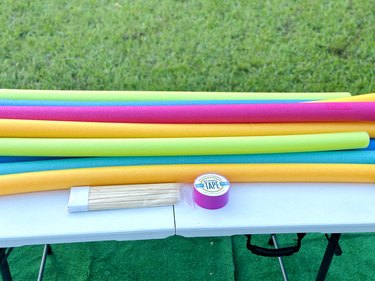
1. Plan the course layout
First things first: Sketch a rough layout of your obstacle course. Consider using a mix of straight runs, curves, and different stations where participants will need to jump, crawl, or zigzag. Find a spacious area to set up your course, like a grassy yard or a park.
2. Create arches and gates
For a classic obstacle, use pool noodles to create arches. Stick two wooden skewers into the ground about 3 feet apart and slide each end of a noodle onto the skewers to form an arch. Secure the top with tape to ensure it stays in an arch shape.
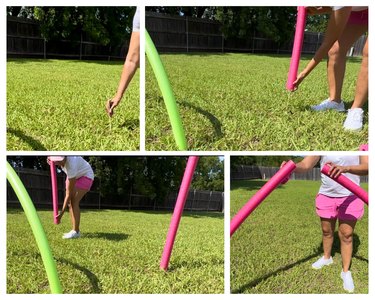
Repeat this to create multiple arches along your course.
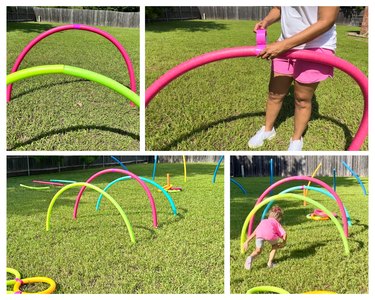
3. Construct a quick-feet ladder
For agility training, make a quick-feet ladder. Take six pool noodles and bend each into a circle, securing the ends with tape.
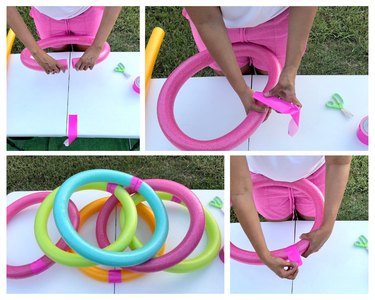
Arrange these noodle rings in a row on the ground, slightly overlapping each circle with its neighbors for stability.
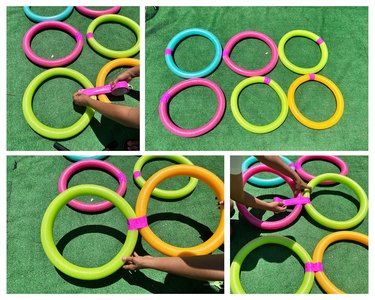
Secure the structure by placing skewers through the tape into the ground at each point where the noodles touch the ground. This setup is perfect for practicing fast footwork.
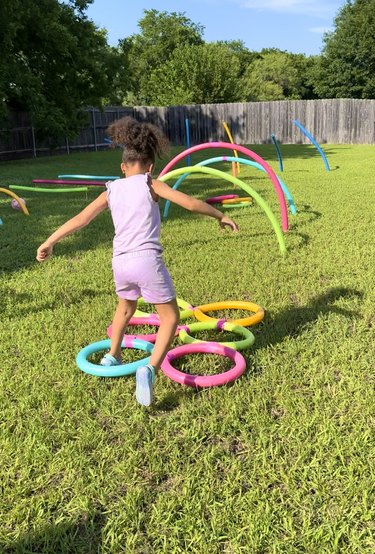
4. Bring on the ring toss challenge
Add a fun ring toss to your course! Cut a pool noodle in half and secure it vertically in the ground using wooden skewers.
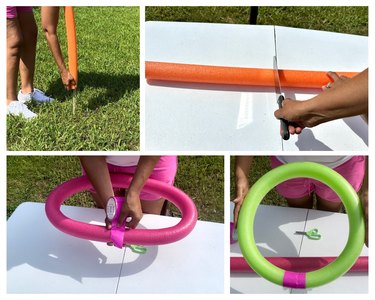
Then, create three rings by bending additional pool noodles into circles and securing them with tape. Players toss the rings over the stationary noodle, testing their aim and adding a playful challenge to the mix.
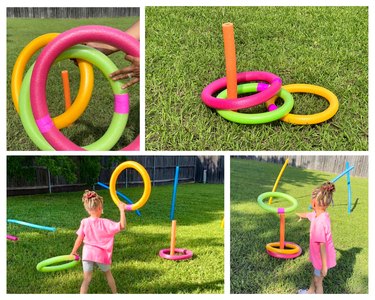
5. Make a slalom course
Drive a wooden dowel or wooden skewers (two skewers per pool noodle) into the ground and slide a pool noodle over it to create a flexible post. Space out these posts in a line with about 2 to 3 feet between each, making a slalom course kids can zigzag through. For added stability, use tape to secure the bottom ends of the noodles to the ground.
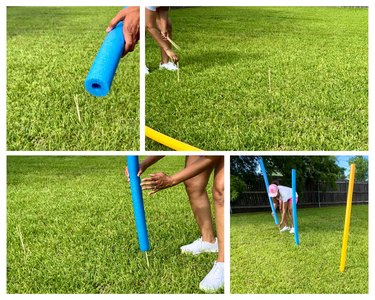
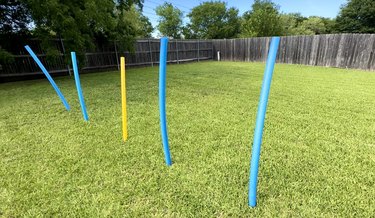
6. Construct low tunnels
Create low tunnels for crawling or kicking a soccer ball through by bending pool noodles into half-circle shapes and securing each end to the ground with skewers. Make the tunnel low enough to encourage crawling but high enough for players to move underneath.
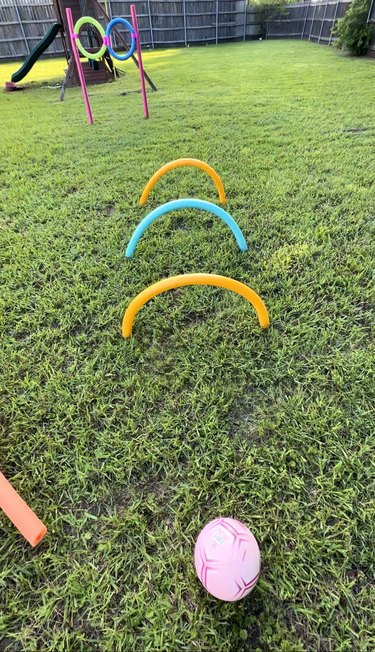
7. Set up some hurdles
Get ready to jump! For the hurdles, take three pool noodles and cut them to desired lengths, if necessary. Place two wooden skewers into the ground several feet apart and lay a pool noodle horizontally across the tops of the skewers. Secure the noodle to the skewers with tape to keep it stable. Repeat this setup at varying distances and heights to create a series of hurdles, making the course exciting and challenging for jumpers of all skill levels.
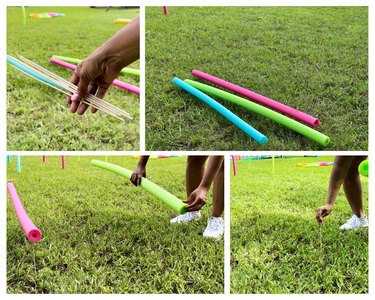
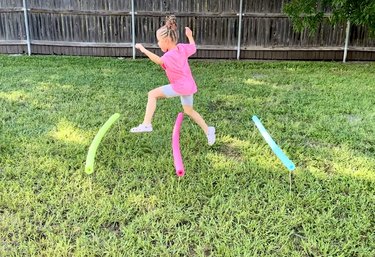
8. Add a noodle toss game
Ready for a grand finale on your obstacle course? Set up a vertical target game that's perfect for testing accuracy and adding a bit of friendly competition. Drive two posts in the ground, a few feet apart — you can use the legs of a volleyball net, PVC pipes, or dowels. Next, bend two pool noodles into circles, secure the ends with tape, and mount them horizontally to your supports.
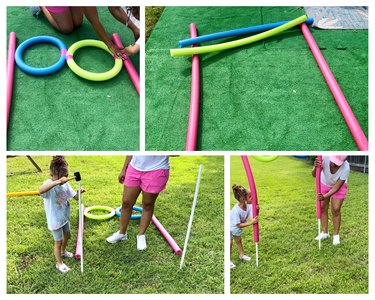
This dual-ring setup challenges participants to throw footballs, smaller balls, or a noodle stick through the rings, making for a fun and engaging way to wrap up the day's activities. Dive in and see who can nail the target!
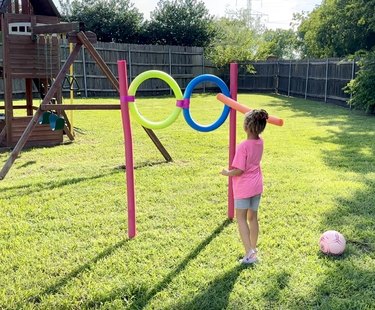
Once your course is set, have participants take turns running through it. You can time each run for a competitive edge or simply enjoy the fun as a leisurely activity. And there's no rule against adults testing their skills on the course!
